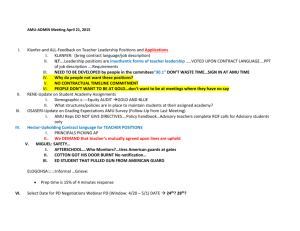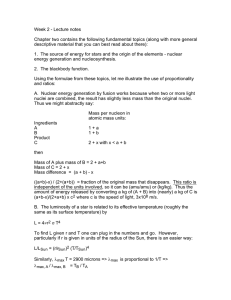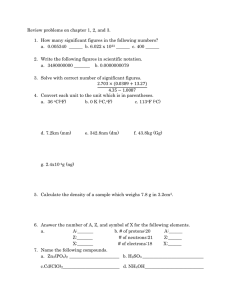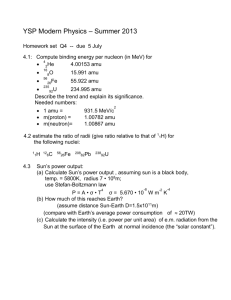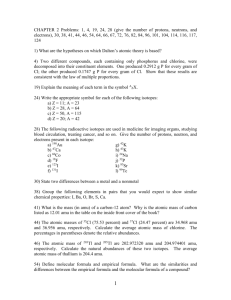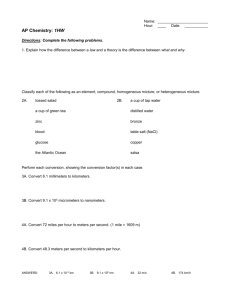1996
advertisement
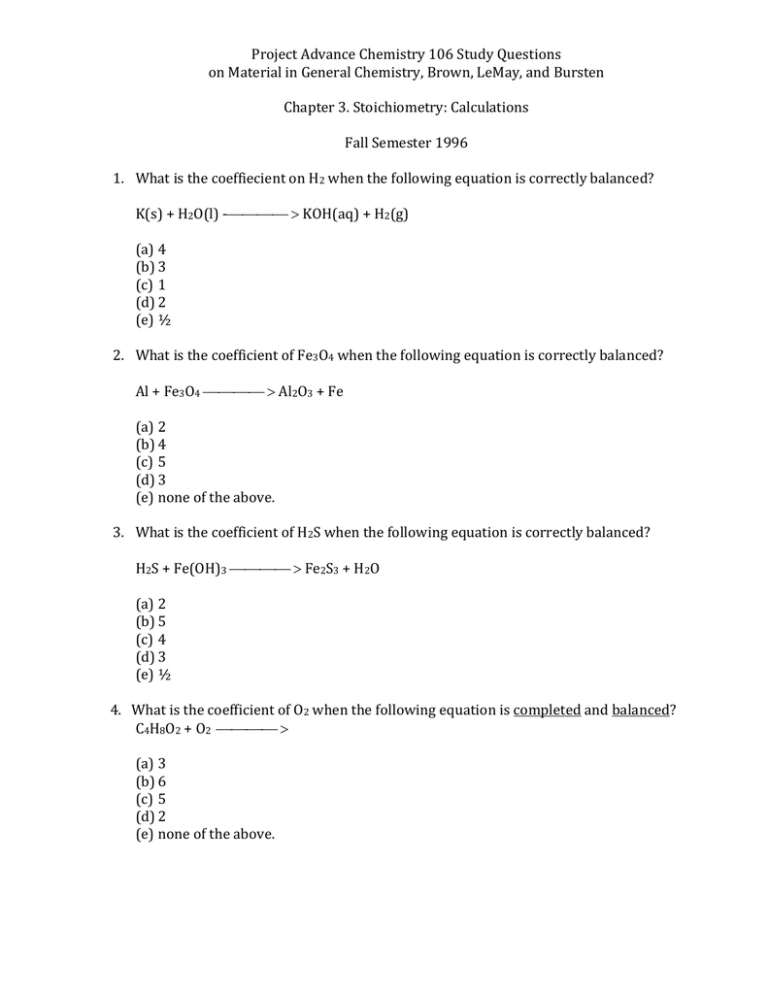
Project Advance Chemistry 106 Study Questions on Material in General Chemistry, Brown, LeMay, and Bursten Chapter 3. Stoichiometry: Calculations Fall Semester 1996 1. What is the coeffiecient on H2 when the following equation is correctly balanced? K(s) + H2O(l) - KOH(aq) + H2(g) (a) 4 (b) 3 (c) 1 (d) 2 (e) ½ 2. What is the coefficient of Fe3O4 when the following equation is correctly balanced? Al + Fe3O4 Al2O3 + Fe (a) 2 (b) 4 (c) 5 (d) 3 (e) none of the above. 3. What is the coefficient of H2S when the following equation is correctly balanced? H2S + Fe(OH)3 Fe2S3 + H2O (a) 2 (b) 5 (c) 4 (d) 3 (e) ½ 4. What is the coefficient of O2 when the following equation is completed and balanced? C4H8O2 + O2 (a) 3 (b) 6 (c) 5 (d) 2 (e) none of the above. 5. The formula weight in amu of silver chromate is (a) 175.87 amu (b) 339.86 amu (c) 159.87 amu (d) 223.87 amu (e) 331.73 amu 6. The mass percentage of Al in aluminum sulfate is (a) 35.94% (b) 15.77% (c) 21.93% (d) 45.70% (e) 7.886% 7. The mass percentage of F in KrF2 is (a) 68.80% (b) 18.48% (c) 145.3% (d) 81.52% (e) 31.20% 8. Element X as three naturally occurring isotopes. The mass of each isotope and its % abundance is: 37.919 (5.07%), 39.017 (15.35%), and 42.111 (79.58%). What is the average atomic mass of element X? (a) 39.68 amu (b) 39.07 amu (c) 41.42 amu (d) 38.64 amu (e)none of the above. 9. What is the molecular weight of the compound C2H5OH? (a) 41 amu (b) 30 amu (c) 46 amu (d) 34 amu (e) none of the above. 10. How many oxygen atoms are contained in 2.74 g of Al2(SO4)3? (a) 12 (b) 5.78 x 1022 (c) 6.02 x 1023 (d) 7.22 x 1024 (e) none of the above. 11. How many carbon atoms are there in 200 molecules of C3H8O? (a) 1.20 x 1026 (b) 600 (c) 200 (d) 3.61 x 1026 (e) none of the above. 12. How many molecules of CH4 are in 48.2 g of this compound? (a) 5.00 x 10-24 (b) 3.00 (c) 2.90 x 1025 (d) 1.81 x 1024 (e) none of the above 13. How many atoms of oxygen are in 300 molecules of CH3CO2H? (a) 3.01 x 1024 (b) 3.61 x 1026 (c) 600 (d) 300 (e) none of the above. 14. Argon gas has a density of 1.40 g/L at standard conditions. How many argon atoms are in 1.0 L of argon gas? (a) 2.1 x 1022 (b) 1.5 x 1025 (c) 4.7 x 1022 (d) 3.4 x 1025 (e) none of the above. 15. A nitrogen oxide (contains only N and O) 63.65% by mass nitrogen might have which molecular formula(s)? (a) Both NO2 and N2O4 (b) N2O (c) N2O4 (d) NO2 16. What is the properly written empirical formula of a compound of molecular formula C2H6 of molecular weight 30.07 amu? (a) C8H24 (b) C3H (c) CH3 (d) CH2 (e) C2H6 17. What is the properly written empirical formula of a compound of molecular formula C6H12 of molecular weight 84.16 amu? (a) CH3 (b) CH2 (c) C12H24 (d) C6H12 (e) C2H 18. What is the molecular formula of a compound of empirical formula CH and formula weight 81 6 amu? (a) C5H5O (b) C6H6 (c) C4H4 (d) CH (e) C4H4S 19. A compound containing potassium, nitrogen, and oxygen was found to be 38.7% by weight potassium, 13.9% nitrogen, and 47.4% oxygen. What is the empirical formula of the compound? (a) KNO2 (b) KNO3 (c) K2NO3 (d) K2N2O3 (e) none of the above. 20. What is the empirical formula of a compound that is 49.4% K, 20.3% S, and 30.3% O? (a) KSO2 (b) K2SO3 (c) K2SO4 (d) KSO3 (e) none of the above. 21. How many moles of H20 are produced when 2.5 moles of 02 react according to the following equation? C3H8 + 5O2 3CO2 + 4H2O (a) 2 (b) 4 (c) 2.5 (d) 3 (e) none of the above. 22. Consider the equation shown below. If 3.0 g of O2 produces 3.4 g of H2O, how many grams of H2O would be produced by 6.0 g of O2? 2H2 + O2 2H2O (a) 6.4 (b) 3.4 (c) 6.8 (d) 1.7 (e) none of the above. 23. How many grams of N2 will be required to completely react with 9.3 g of H2 according to the following equation? N2 + 3H2 2NH3 (a) 2.0 (b) 1.3 X 102 (c) 3.9 X 102 (d) 43 (e) none of the above. 24. Determine the number of grams of SO2 that would be produced by the reaction of 15 g of CS2 according to the following equation? CS2 + 3O2 CO2 + 2SO2 (a) 13 (b) 25 (c) 6.3 (d) 6.5 X 102 (e) none of the above. 25. For Ru3(CO)12 + 9AsF3 3Ru(CO)2(AsF3)3 + 6CO, how many millimoles of Ru(CO)2(AsF3)3 can form from a mixture of 2.0 mmol Ru3(CO)12 and 24 mmol AsF3? (a) 54 (b) 12 (c) 2.0 (d) 6.0 (e) 8.0
